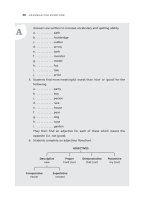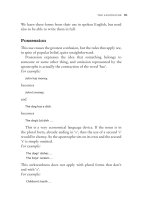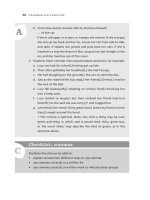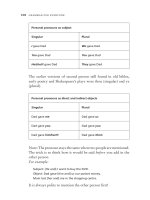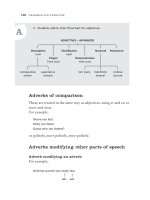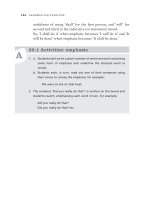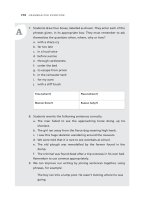Tài liệu Grammar for everyone part 10 docx
Bạn đang xem bản rút gọn của tài liệu. Xem và tải ngay bản đầy đủ của tài liệu tại đây (148.7 KB, 7 trang )
Adjectives
Colour your world!
Definition: The word ‘adjective’ is from Latin ad jacere meaning
‘throw to’ or ‘add’. In the grammatical sense, this means to add the
characteristics of something, i.e. to qualify it.
Before studying adjectives, students should:
• know the definition of a noun
• recognise nouns, both common and proper
• be able to give examples of nouns
Adjectives tell us more about nouns.
For example:
a red rose a distinguished scholar
Remember: this, that, these and those, which are pronouns stand-
ing on their own, are adjectives if the noun is specified. We call
these possessive adjectives.
For example:
This is tasty. [pronoun]
But – This cake is tasty. [adjective]
Explained clearly, this is a lesson in logic.
The terms ‘limit’ and ‘modify’ are sometimes used with adjec-
tives, but these are also applied to adverbs, and it is helpful for
the student to use different terms, to better distinguish one from
another. For young children, the word ‘describe’ for adjectives
is preferable as they will be familiar with the word and readily
understand its meaning and application.
4
53
A
Ezra Pound preferred poetry without adjectives. He states:
‘The true poet is easily distinguished from the false when he trusts
himself to the simplest expression and writes without adjectives.’
And Mark Twain wrote: ‘As to the adjective, when in doubt, strike
it out.’
1
On the other hand, Humpty Dumpty in Alice Through the
Looking Glass, proclaims that: ‘You can do anything with adjec-
tives.’ But the best advice comes from William Safire: ‘Adjective
salad is delicious, with each element contributing its individual
and unique flavour; but a puree of adjective soup tastes yecchy.’
2
Well-chosen adjectives are succinct and titillate the imagination,
while a surfeit must inevitably diminish. Words, such as ‘nice’
change in meaning over time and many words such as ‘terrible’,
‘fantastic’ and ‘fabulous’ have lost their preciseness, such that it is
difficult to find sufficiently expressive replacements. It behoves all
teachers and tutors to encourage students in the rigorous exercise
of accuracy and the development of an extensive vocabulary to
draw from.
Young children need a free hand to practise and experiment
with all the words at their disposal. The middle years will be
especially important for training them in selectivity and adapting
language to the purpose of the writing. Adjectives provide excel-
lent opportunities for discussion.
1 Crystal, David & Crystal, Hilary 2000, Words on words: Quotations about
language and languages, Penguin Books, Middlesex, UK.
2 ibid.
4.1 Activities: adjectives
1. The outdoor activities suggested for nouns can now be done for
practising adjectives, with the students adding qualifiers to the
nouns they cite, for example:
A broken fence
A new concrete tank
54
G r AM MAr fo r e Ve rY one
A
2. Students can be provided with interesting puzzle exercises:
a. a list of interesting nouns and a list of colourful adjectives that
can be matched, for example:
Nouns: toad, shoes, journey, truck, bride, worm, doughnut,
tooth, uncle, track
Adjectives: grumpy, broken-down, dusty, tasty, loose, pretty,
incredible, wriggly, slimy, worn-out
b. a list of interesting nouns for students to qualify with suitable
adjectives of their choice
3. Each student writes a noun on a piece of paper. The papers are then
passed in the same direction to the adjacent student. Students each
add an adjective to the noun they have received.
4. Students mark or list adjectives from a selected passage of prose or
poetry.
5. Provide sentences or a short passage without adjectives. Students
make it descriptive by adding appropriate adjectives of their own
choice.
6. Students are provided with pairs of initial letters with which they
make adjective–noun combinations, for example:
f . . . . . p . . . . . – fat pig, fenced paddock
Extra points could be allocated for inventiveness, suitability and
correct spelling.
a. l . . . . . t . . . . .
b. y . . . . . f . . . . .
c. s . . . . . b . . . . .
d. g . . . . . p . . . . .
e. w . . . . . d . . . . .
f. a . . . . . l . . . . .
g. l . . . . . w . . . . .
h. w . . . . . h . . . . .
i. f . . . . . m . . . . .
j. d . . . . . a . . . . .
55
A d je cti Ves
A
Adjectives formed from nouns and verbs
Adjectives can be formed from nouns to express the quality of the
noun.
For example:
point [noun], pointed [adjective]
hope [noun], hopeful [adjective]
Adjectives can also be formed from verbs.
For example:
to run [verb], running [adjective]
to believe [verb], believable [adjective]
Older students can be given exercises in forming one part of speech
from another.
Words that can be used as several parts of
speech
We are reminded that words take their part of speech from the
function they have in the sentence. For example, the word bank
can be:
a noun: I went to the bank.
a verb: He will bank the money he earned.
an adjective: These are foreign bank notes.
4.2 Activities: adjectives and nouns
1. Students can be given a variety of words to use in sentences in
different ways, as above. They mark the part of speech of each one,
for example:
mail, dust, wash, bath, motor, bore, saw, glue, post, side, water,
pump, pipe, dress
56
G r AM MAr fo r e Ve rY one
A
2. Students find their own words that can function as several parts of
speech, such as water, whip, string. This is a really useful exercise for
reinforcing understanding of the functions of words.
3. Form adjectives from nouns, for example:
noise [noun], noisy [adjective]
Students may need a dictionary.
a. wood
b. child
c. hope
d. picture
e. beauty
f. disaster
g. fame
h. memory
i. dive
j. crime
4. Form adjectives from verbs, for example:
run [verb], runny [adjective]
Some of these are also past participles which will be taught in a
later section.
a. copy
b. rot
c. wear
d. drive
e. speak
f. dread
g. sweep
h. dictate
i. write
j. grieve
57
A d je cti Ves
Adjectives of degree and comparison
These are alternative terms applied to the act of comparing the
extent or amount of the quality expressed by the adjective. We show
this comparison by adding endings (suffixes) to the adjectives.
If two things are compared (comparative form), we use the
suffix er.
For example:
Dad’s voice is louder than Mum’s.
Your baby is heavier than mine.
Note how the y of heavy has been changed to i with the addition
of an ending.
If more than two things are compared (superlative form), est is
the correct ending.
For example:
Colin’s voice is loudest of all.
My BMX is the fastest on the track.
Some adjectives would become very clumsy with the endings
added, so we have the alternative of preceding the adjective with
more or most. This usually applies to longer words such as ‘sensible’
or ‘beautiful’. Sometimes it is just a matter of ease on the ear.
For example:
Comfortable: This chair is comfortable; that chair is more comfortable
but Grandad’s chair is most comfortable.
Some of the words that we find hard to categorise are, on
further examination, clearly adjectives, as they tell more about
nouns. Students do need to realise this so that they can fit them
into the scheme of things. They should be explained, although the
terms need not be memorised at this stage.
Note: For correct use of few and less see pages 129, 193.
58
G r AM MAr fo r e Ve rY one
A
4.3 Activities: degree and comparison
1. Students should write the chart of comparisons in their grammar
exercise books and add more words of their choice.
2. Students can practise comparative and superlative forms orally.
Suggest a word for which students add the comparative and super-
lative forms. They can put them into sentences.
3. A large chart may be made by the students to hang on the wall. If the
chart is laminated, students can add new words using whiteboard
pens.
4. Students select words from boxes to match with suitable nouns (see
following page).
swift scary winding gifted glamorous
gripping rickety cunning rusty brave
59
A d je cti Ves
Colin’s voice is the loudest of all.
